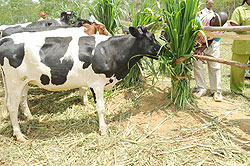A programme inspired by Banque Populaire du Rwanda (BPR), Gir’inka scheme, which offers special loans to farmers to purchase cows, is mired with irregularities, The New Times has learnt. During a news conference yesterday, the Minister of Agriculture and Animal Resources (MINAGRI), Dr Agnes Kalibata disclosed that early last year, farmers who benefited through the BPR programme claimed they were given overvalued cows.


A programme inspired by Banque Populaire du Rwanda (BPR), Gir’inka scheme, which offers special loans to farmers to purchase cows, is mired with irregularities, The New Times has learnt.
During a news conference yesterday, the Minister of Agriculture and Animal Resources (MINAGRI), Dr Agnes Kalibata disclosed that early last year, farmers who benefited through the BPR programme claimed they were given overvalued cows.
She noted that when the farmers objected, the ministry commissioned an inquiry, which confirmed the irregularities in the programme.
According to Kalibata, since 2007, 3,590 farmers have received cows under the programme, and out of this number, 795 got them at inflated prices.
Launched in 2007, the cattle-stocking initiative was meant to ensure that at least every poor household across the country owns a cow.
Under the programme, the bank provides loans to farmers through districts, which are charged with the responsibility of contracting entrepreneurs to procure the cows on behalf of the beneficiaries.
After purchasing the cows, entrepreneurs then supply them to districts for distribution to farmers.
According to the findings of the inquiry, beneficiaries were swindled approximately Rwf 146 million.
However, Kalibata clarified that the ministry would ensure that farmers repay the loans based on the type of the cows they received..
"We visited every farmer who received a cow under this programme and we established the actual value of every cow. The ministry recently met the management of BPR to show them the anomalies of the programme,” she said.
She apportioned blame to district officials, who she said, were responsible for supervising the whole distribution process.
"The difference between what the BPR paid and what the farmers received will be paid by whoever took the money; whether it’s the bank itself or district officials, or even the entrepreneurs,” Kalibata said.
She added that the ministry would ensure that the programme goes back on track, stressing that there was no reason why banks should not lend money to farmers.
Efforts to talk to the BPR management on the matter were fruitless as their phones were not available by press time.


